Ataul Fatir Tahir
From Noahas facing mockery to Abrahamas being hurled into fire; from Jesusas facing the cross to Muhammadsa being chased out of his homeland, enduring boycotts, persecution and mockery pervade the lives of prophets.
Despite constant abuse and violent persecution, prophets of God react with “patience and prayer” and are always triumphant in their mission (Surah al-Baqarah, Ch.2: V.46). Dark days do not end for they continue even after prophets pass; the baton is handed to the khilafat that follows.
Regarding khilafat, Allah makes the same promises of support – “He will surely establish for them their religion” and “He will surely give them in exchange security [and peace] after their fear.” (Surah al-Nur; Ch.24: V.56)
The Promised Messiahas stressed the importance of his Khilafat, as it was God’s “ever-lasting promise”. (The Will, p.7)
He said, “It is essential for you to witness the second manifestation also and its coming is better for you because it is everlasting, the continuity of which will not end till the Day of Judgement.” (Ibid)
Khilafat-e-Ahmadiyya is living proof of these promises that Allah declared. Not only has Islam Ahmadiyyat continued to win the hearts of millions – in spite of 131 years of clerics toiling to end it – but security and peace have been around the corner at every difficult turn. Khilafat-e-Ahmadiyya is a beacon of divine peace and security, and our history proves it.
As Hazrat Mirza Masroor Ahmad, Khalifatul Masih Vaa said, “Ahmadis are the fortunate ones, for whom the khalifa of the time constantly worries. There is no difficulty – be it individual or communal – that Ahmadis across the world face and the khalifa of the time does not address. And to solve it, does not – besides exerting [practical] effort – bow before God Almighty and pray to Him.” (Friday Sermon, 6 June 2014)
These supplications create a commotion in the heavens and millions of Ahmadis can attest to their efficacy; this is what brings divine “security and peace”.
In this piece, we wish to highlight how, during each khilafat, Allah has helped Ahmadiyyat, as a community, during the most arduous of times.
The history of Islam Ahmadiyyat is rampant with persecution and difficulties. Detailing them all is not the purpose of this article, rather an overall picture is desired, of how establishment of religion followed by security and peace, as promised by Allah, has always arrived at the doorstop of Khilafat-e-Ahmadiyya.
When the Promised Messiahas passed away, the Jamaat was left vulnerable. There was fear and opponents of Ahmadiyyat began, literally, dancing in jubilation with the confidence that Ahmadiyyat would perish. It was a perilous time for the Jamaat. Thunderstorms and dark clouds of internal dissension would gather, but ultimately Allah transformed this fear into security and peace.
The first breath of fresh air for the Jamaat came through the blessed institution of Khilafat-e-Ahmadiyya, with Hazrat Hakim Maulvi Nuruddinra as the first khalifa. But the brewing internal hate would soon manifest itself.
Even when the Holy Prophetsa passed away, instant fear struck the Companionsra. Despite the establishment of Khilafat-e-Rashida, there were some who disconnected themselves from it, while others accepted it with perversity in their hearts.
History repeated itself. The second renaissance of Islam – Ahmadiyyat – saw the same dissension amongst some adherents. A group who were ultimately called the Paighamis (or “Lahoris”) had initially questioned the need for khilafat and then, once it was unanimously agreed upon and established, pushed their agendas to ultimately end Khilafat-e-Ahmadiyya. They deviously spread leaflets to misdirect and influence Ahmadis behind Hazrat Khalifatul Masih I’sra back. They would hold misleading discussions on the need for khilafat and the purpose of a khalifa. Such malicious conspiracies were ushered behind the back of Khalifatul Masih Ira, the aim of which was to end Khilafat-e-Ahmadiyya.
Baseless allegations were raised, for example, claiming that Hazrat Khalifatul Masih Ira was “too old” and should not lead the Jamaat (Hayat-e-Nur, p. 687). But this did not go unnoticed.
The seriousness and danger of this wave of opposition could have ended Khilafat as we know it today. If (and that’s a big “if”) it had succeeded (God forbid) true Islamic teachings and the future of Islam Ahmadiyyat would have been put in jeopardy. But Allah’s promised of “establishing their religion” while giving “security and peace” inhibited lasting harm.
Hazrat Khalifatul Masih Ira strongly uprooted the attempts against Khilafat and even asked the concerned members of these futile discussions to perform Bai‘at at his hands again to prove their loyalty.

Despite publicly attesting to Khilafat, the attempts to end it continued throughout the life of Hazrat Khalifatul Masih Ira. Those pushing these agendas included well-respected companions of the Promised Messiahas who had rendered great services for the Jamaat and held a level of influence.
But no matter who it is, if attacks are made against Allah’s Khilafat, the honour and grandeur of God comes into play.
Hazrat Khalifatul Masih Ira was an iron-clad wall in front of such accusations and attacks on Khilafat. He would remind them of the “pledge” they had taken. He once said:
“Listen and remember well! Allah the Almighty has Himself made me the Khalifa. By the grace of Allah, I am not in need of any of you … Allah does not like such things. He has great honour for me …”
This honour of God for Hazrat Khalifatul Masih Ira is proven in the pages of history.
At another instance, he declared:
“Khilafat is a matter of Shariah. Without Khilafat, the Jamaat cannot succeed. Allah has told me that if anyone from amongst them leaves, then He shall give me a whole Jamaat in return … I believe in the grace of God, that He shall help me.” (Hayat-e-Nur, p. 378-379)
Hazrat Khalifatul Masih Ira would openly challenge them to try and snatch the divine mantle of Khilafat from him, while also guaranteeing their failure to do so.
“Allah chooses the khalifa”, he would make clear. “You can throw thousands of allegations of incompetence [to be the khalifa] at me, but they will not fall upon me, rather they will be aimed at God, Who has chosen me.” (Hayat-e-Nur, p. 352)
He reduced all hopes that such people had for power. Hazrat Khalifatul Masih Ira categorically said, “No one shall make you a khalifa, nor can anyone else become a khalifa during my lifetime. When I die, only he will stand [in this position] who God chooses and God will establish his position.” (Ibid)
Despite the influence those who were attacking khilafat held, regardless of their endless and dangerous attempts to break this blessed institution, Allah changed the fear of Ahmadis into “peace and security” and established their religion through Hazrat Khalifatul Masih Ira.
Ahmadis remained unified through Huzoorra and Allah’s protection hindered all attempts to remove Khilafat-e-Ahmadiyya. It soon became apparent that Khilafat-e-Ahmadiyya was shrouded with the grace of God and the appointed khalifa would always be a source of security and peace for the community.
At the demise of each khalifa, the Jamaat has experienced fear, which is swiftly healed by the election of the next khalifa.
After Hazrat Mirza Bashiruddin Mahmud Ahmadra was elected as Khalifatul Masih II, the Jamaat was granted solace once again. However, the separation of the Lahori Jamaat from khilafat was the first of many waves of difficulties.
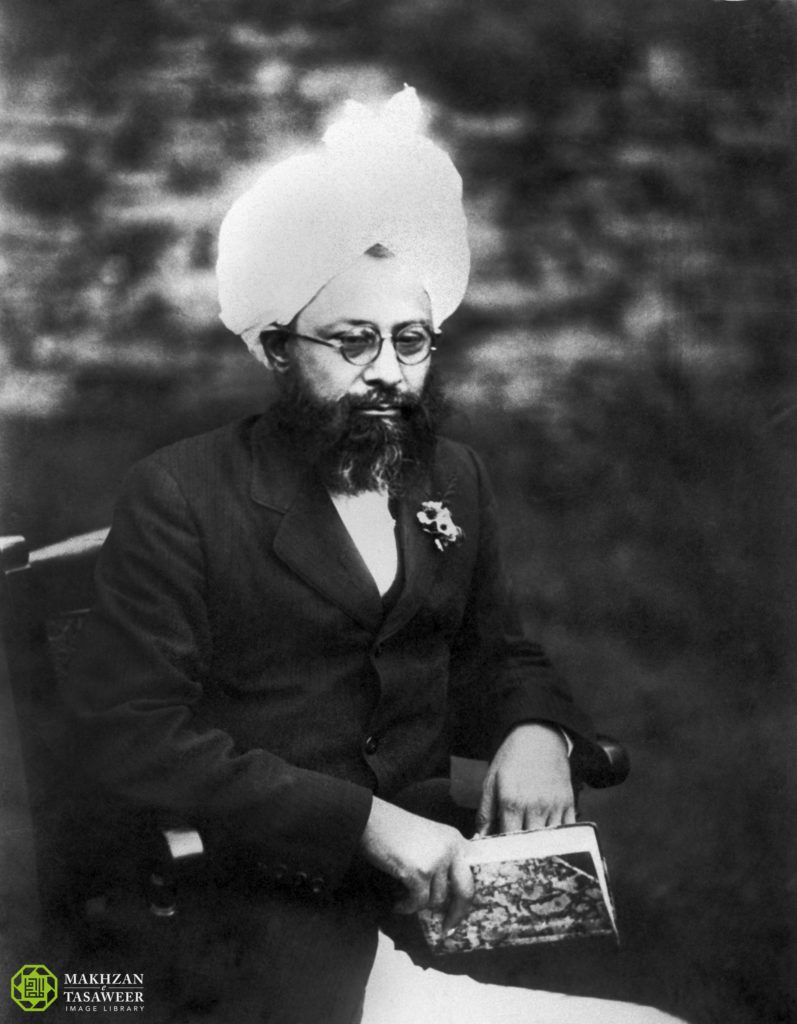
The glorious 52 years of Hazrat Musleh-e-Maud’sra era are testimony to how Allah presented khilafat as a source of security and peace for the Jamaat while establishing their religion. From being left alone, without anything in the treasury, as a young 25-year-old khalifa to an attempt made on his life, Hazrat Musleh-e-Maudra showed, without a shadow of doubt, the divine support that Khilafat-e-Ahmadiyya possessed.
We choose just two instances from the second era of khilafat.
The first is of the dangerous flurry of anti-Ahmadiyya rhetoric started by the political movement, Majlis-i-Ahrar-i-Islam, created in the last part of the 1920s and the early 1930s.
Anti-Ahmadiyya propaganda emerged as one of the strongest sentiments of the Ahrar and they started to gain popularity among Muslim circles. Rhetoric against Ahmadis spewed by the Ahrar soon turned into protests, demonstrations and open-air conferences, where hate-inciting speeches and slogans were the only content. They had vowed to smash every brick in Qadian and wipe Ahmadiyyat out.
Speaking of the anti-Ahmadiyya rhetoric, Dr Sadia Saeed, from the University of San Fransisco, said:
“Virtually from the beginning of their formation in 1931, the Ahrars had launched a public anti-Ahmadi campaign, demanding in 1934 that the community be declared outside the pale of Islam and that no Ahmadi be appointed to a public office, the latter being a direct reference to Zafarulla Khan, a prominent Ahmadi personality who was later appointed the first Foreign Minister of Pakistan … During the anti-colonial movement, the Ahrar Party eventually aligned itself with the Indian National Congress and openly opposed the movement for the creation of an independent Pakistan.” (Studies in Ethnicity and Nationalism, Vol. 7, no. 3, Yale University)
The Ahrar’s hate for Ahmadiyyat boiled further as Hazrat Khalifatul Masih IIra was chosen to head the All India Kashmir Committee, inadvertently mobilising Muslims. This angered the Ahrar who were desperate for political control over Indian Muslims.
Violent demonstrations and hate campaigns against the Jamaat began to spread like wildfire.
Tahir Kamran, a notable Pakistani historian, noted:
“Subsequently Qadian, the Ahmadi headquarters, became the prime focus of the Ahrar’s assault. The Ahrar leadership had already instituted the Dawat-o-Irshad on 4 March 1933 with the purpose of raising funds as well as a volunteer corps of 100,000 men to combat the growing influence of the Ahmadiya. While this grandiose scheme never came to fruition, the Ahrar persisted in their anti-Ahmadiya activities…
“On 22 October 1934 the Ahrar paraded on the streets of Lahore, chanting anti-Ahmadi slogans and appealing to Muslims to boycott the Ahmadi community … The Ahrars not only emphasized the importance of the finality of the prophethood, but also the difficulties faced by Sunni Muslims living in Qadian. Lengthy and eloquent addresses were delivered, including a five-hour tour de force by the Ahrar leader, Ata Ullah Shah Bukhari. He, however, overstepped the mark in expressing his hatred of the Ahmadis, and his subsequent arrest and conviction generated a wave of popular sympathy for the Ahmadiya community.
“In 1935, the populist appeal of the Ahrar waned as fast as it had waxed…” (The Pre-History of Religious Exclusionism in Contemporary Pakistan: Khatam-e-Nubuwwat 1889-1953. Cambridge University Press)
Speaking of the situation that had developed due to the Ahrar, Hazrat Mirza Bashir Ahmad MAra wrote:
“Only those people can realise the intensity of the situation who, on the one hand, heard the speeches of Hazrat Khalifatul Masih [II] and on the other, saw the activities and inspections of the Ahrar and government officials in Qadian.” (Silsila-e-Ahmadiyya, Vo. 1, p. 409)
Hazrat Mirza Bashir Ahmadra then writes:
“Though the history of those days was painful, they were also hugely majestic. Painful because the enemies, using superior weapons, attempted to hurt, defame and destroy the Jamaat in every way possible. And majestic because where Hazrat Khalifatul Masihra would be a step ahead of every ploy from the enemy, each step of his, like that of a bouncy rubber ball, would also reach new heights following every attack of the enemy.” (Silsila-e-Ahmadiyya, Vol. I p. 410)
How Hazrat Khalifatul Masih IIra was able, through divine help, to steer the small boat of Ahmadiyyat out of this tempest while keeping the flag of Ahmadiyyat high in the sky was what baffled so many.

“Not for a minute did Hazrat Khalifatul Masih let the honour of the Jamaat fall”, noted Hazrat Mirza Bashir Ahmadra.
History has gloomy records for the end of the Ahrar, but the story of Ahmadiyyat’s journey, from fear to security and peace, is for all to admire. They had planned to end Ahmadiyyat in the Indian subcontinent, but through the Tahrik-e-Jadid scheme launched by Hazrat Musleh-e-Maudra, the Jamaat spread to the corners of the earth.
The partition of India and the transfer of the new headquarters of the Jamaat to Pakistan, Rabwah is another moment when the state of fear transformed into security and peace through Khilafat.
Let’s not forget, the episode of the partition was extremely grave and stained with endless blood.
Describing it, Alex von Tunzelmann, in her Indian Summer: The Secret History of the End of an Empire, notes:
“In Stalin’s famous words, one death is a tragedy; one million deaths is a statistic. In this case, it is not even a particularly good statistic … That is the true horror of the events in the Punjab in 1947: one of the vilest episodes in the whole of history, a devastating illustration of the worst excesses to which human beings can succumb. The death toll is just a number.”
Moving hundreds of thousands of Ahmadi Muslims from India to Pakistan without harm is an unimaginable feat that Hazrat Musleh-e-Maudra achieved with Allah’s help. Nationwide political unrest and unimaginable murders, on both sides, was commonplace and the fear of being raped, murdered, beaten and looted was very real.
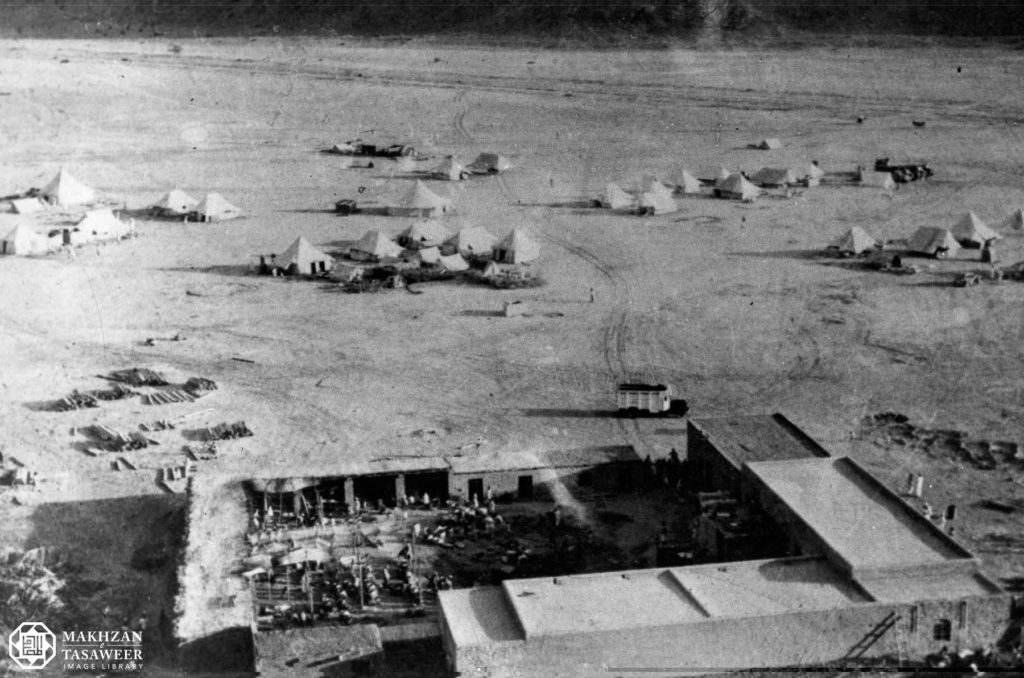
It was not an individual move for Jamaat members. Hazrat Musleh-e-Maudra had decided to literally re-plant a whole garden in another land. He described the feat in the following words:
“Reaching here (Pakistan), I truly felt that my task was not to uproot a tree and replant it, but to move a whole garden and replant it. (Al Fazl, 31 July 1947)
Rabwah was known for its coarse land, lack of clean water and uninhabitable nature. But through the blessing of Allah, Khilafat-e-Ahmadiyya once again manifested the prophecy of “He will surely give them in exchange security [and peace] after their fear.” (Surah al-Nur; Ch.24: V.56)
Today, Rabwah stands as an example of how a model town should be in Pakistan.
The Khilafat of Hazrat Mirza Nasir Ahmad, Khalifatul Masih IIIrh also saw moments of great fear and anguish, where the leadership of Khilafat transformed unrelenting fear into security and peace.
Anti-Ahmadiyya rhetoric had been further politicised across Pakistan following the 1953 riots and persecution targeted at Ahmadi Muslims. This reached its peak during the era of Hazrat Khalifatul Masih IIIrh, when Pakistan ultimately succumbed to right-wing extremist politics and allowed religious clerics to control the narrative.
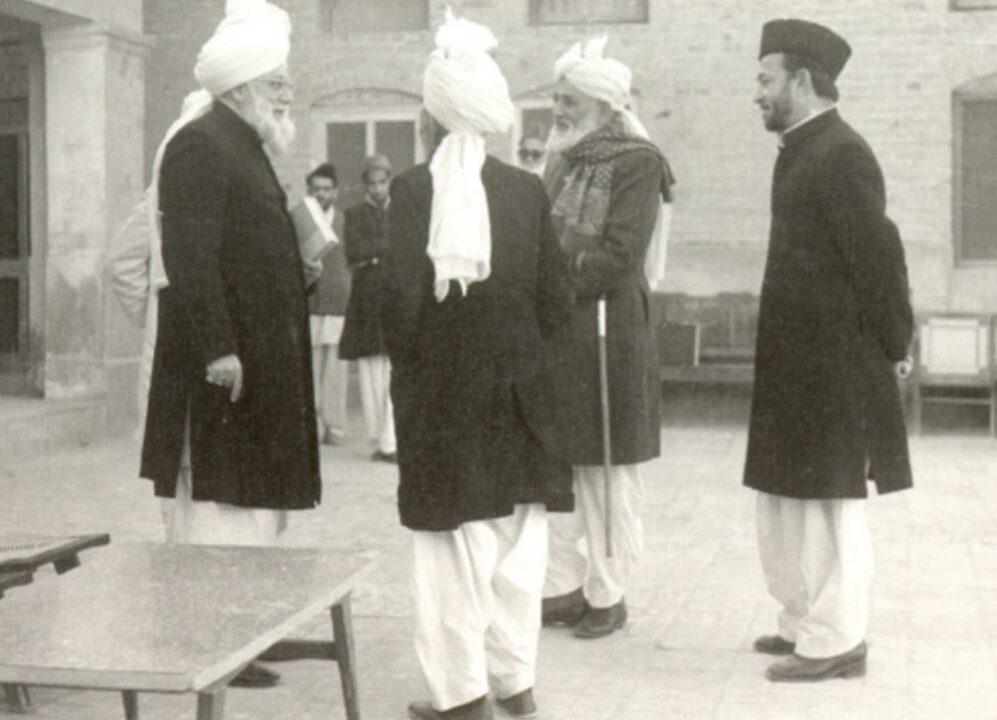
The Second Amendment to the Constitution of Pakistan was passed, declaring Ahmadis as non-Muslims and prohibiting them from identifying as Muslims.
Despite strong intellectual proofs based on the Holy Quran, sunnah and ahadith presented by a team led by Hazrat Khalifatul Masih IIIrh in front of the National Assembly of Pakistan, the government decided to label Ahmadis as non-Muslims through constitution – it was an entirely political move.
Just take a moment and reflect; a whole religious community, based on Islamic principles of peace, a community that never reacted violently, was forced to declare themselves as non-Muslim. The deep emotional cuts this ordinance gave are unimaginable, when overnight, you are declared as non-Muslims even though you love the Holy Quran and the Prophet of Islamsa more than anything else!
What could have transpired if this was done to a community that didn’t possess a divinely appointed leader draws our imagination into dark and horrible places.
When this resolution was passed, conditions for Ahmadis across Pakistan instantly became dangerous. There was no government protection and Ahmadis, rightly so, feared for their lives and safety. They stopped attending schools, colleges and universities due to the harassment and violence that the constitutional amendment had released. However, Hazrat Khalifatul Masih IIIrh urged them to keep their heads up high, not to lose faith in their Lord, nor be afraid of anyone. He instructed students to go back to their schools, colleges and universities and continue their lives.
The first Friday Sermon, following the amendment that took place on 7 September 1974, was on 13 September. The basis of the sermon further solidifies the proof that Ahmadis are not only Muslims but practice their faith too. The sermon was about how the Jamaat should react to the amendment.
Hazrat Khalifatul Masih IIIrh reminded Ahmadis to reconfirm their faith; to introspect and realise that their hearts are full of Islam. He spoke of the love Ahmadis hold for Allah and His divine attributes. He highlighted the fear Ahmadis have in upsetting Allah and the hope of His mercy they crave.
Hazrat Khalifatul Masih IIIrh spoke of how it is Ahmadis who believe and follow the teachings of the Quran, the Holy Prophetsa and it is they who have accepted the Imam of the age. True worry should be whether God loves us or not, he stressed. It does not matter what people think of us for we know we are Muslims.
Hazrat Khalifatul Masih IIIrh then presented two injunctions of the Holy Quran to be the guiding light for the Ahmadi reaction to the Second Amendment. Hazrat Khalifatul Masih IIIrh said:
“Firstly Allah says:
واللّٰہُ لَا يُحِبُّ الظَّالِمِينَ
“meaning that Allah loves not the wrongdoers. If this is true – and there is no doubt that it is – because the Holy Quran has announced that Allah is angered due to wrongdoing, then there can never be a reaction by Ahmadis at any occasion that would result in wrongdoing … Our sight is set on one target and that is Allah, Who is the Greatest.” (Friday Sermon, 13 September 1974)
Huzoorrh, in the same sermon, made it clear that any Ahmadi who opposed the teachings of the Quran and reacted unfittingly could not be called a true Ahmadi Muslim.
The second injunction of the Holy Quran Hazrat Khalifatul Masih IIIrh asked Ahmadis to keep in mind was:
وَ اللّٰہُ لَا یُحِبُّ الۡفَسَادَ
“…and Allah loves not disorder.” (Surah al-Baqarah, Ch.2: V.206)
From this verse, Huzoorrh stressed that no Ahmadi should fight for their rights in a manner that would lead to disorder, conflict and unrest. Yes, everyone deserved their rights, Huzoorrh noted, but to fight for them and create disorder was not Islamic. Hazrat Khalifatul Masih IIIrh made it clear that “the reaction of an Ahmadi over the 7September declaration should not be such that the world sees it as wrongdoing, nor should there be disorder as a result …” (Friday Sermon, 13 September 1974)
Hazrat Khalifatul Masih IIIrh concluded his sermon by telling Ahmadis, “… When God Himself has declared you Muslim, then what worry is there? Let the world say what it wants. You have nothing to worry about.” (Friday Sermon, 13 September 1974)
This is true divine leadership. This is what Khilafat encapsulates. It guides people from a state of extreme anguish and fear into solace and peace.
Hazrat Khalifatul Masih IIIrh enabled Ahmadis to introspect and realise how it didn’t matter if the government declared them non-Muslim, for what mattered was their personal connection and love with Allah. No one could erase the kalimah (Islamic creed) from their hearts.
It was this positivity and rationale that tamed Ahmadis from reacting in any manner that would cause disorder or wrongdoing. They would listen to the directives of their Imam, Hazrat Mirza Nasir Ahmadrh, who would preach, “We will always be smiling” and “Love for all, hatred for none”.
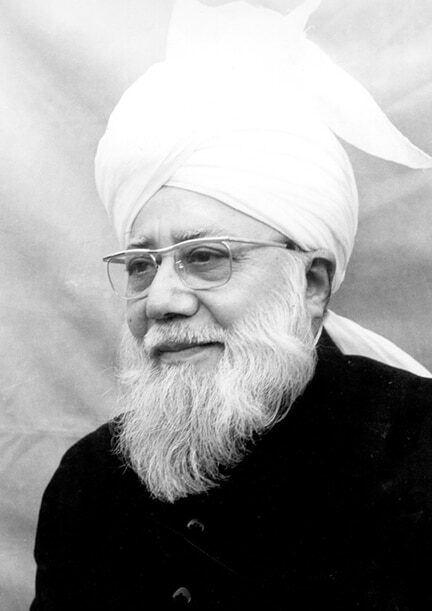
Ten years later, General Zia-ul-Haq would jump on the bandwagon of right-wing politics and stoop to the level of extreme Muslim clerics in Pakistan. He passed Ordinance XX, barring Ahmadis from practising Islam.
Ahmadi mosques were now merely known as “worship places”. They could not use Islamic terminology, call the azan, read the Quran or utter the Islamic greeting of “Assalamo alaikum”. If violations were made, it meant three years imprisonment along with fines.
The year of 1984 dawned upon the Jamaat, when Hazrat Mirza Tahir Ahmadrh was the Khalifa, who had been elected only two years prior. Ordinance XX was a direct attack on Khilafat-e-Ahmadiyya. It meant that the Khalifa could not operate and teach Islam in Pakistan.
One US diplomat pointed out to Hazrat Khalifatul Masih IVrh that in Pakistan, “… everyone is crying for your head.” (Iain Adamson, A Man of God,p. 181)
A swift and covert migration from Pakistan was the only option and despite great odds against the Jamaat, Allah the Almighty converted fear into absolute security and peace.
A Man of God by Iain Adamson described the migration in the words of Hazrat Khalifatul Masih IVrh. By reading the ordeal of escaping Pakistan, it seems to have been nothing short of a miracle. Without Allah’s promise of security and peace for Khilafat, there was no refuge.
Hazrat Khalifatul Masih IIIrh had made it clear in 1974 that he was not afraid of any political leader or government. He was unshaken and only feared Allah. “The one who says I fear worldly powers is, in other words, announcing that my connection with God has ended …” he declared. (Silsila-e-Ahmadiyya. Vol. 3, p. 530)
Hazrat Khalifatul Masih Vaa announced the same unyielding faith in Allah and the power of prayers.
“If governments stand against us, they will collapse. If institutions oppose us, they will be destroyed”, he declared. (Friday Sermon, 27 October 2006)
Hazrat Khalifatul Masih IVrh gave the same message, “I was never in any way scared of General Zia. I had criticised him very openly in my sermons. I had told him, ‘Mend your ways and your attitude. Cease this persecution or you will face the Wrath of God.’” (Iain Adamson, A Man of God, p.188)
However, Ordinance XX had taken away the right to speak out. As Hazrat Khalifatul Masih IVrh noted, “… with this ordinance it was a different kind of situation. It was not my safety that was at stake, but my ability to speak out. With this law Zia could silence me as the effective head of the Community. I could remain in Pakistan and speak out and then be put into prison.” (Ibid)
Huzoorrh, after much deliberation, decided to leave Pakistan immediately, but he agreed with a caveat. He would only leave if there was no official warrant by the government of Pakistan to arrest him or to appear before a court. If there was, then he wouldn’t leave. The reason given by Huzoor was:
“My departure in those circumstances would allow people to malign the Khilafat, perhaps not directly, but certainly by rumour. It would be said that I was guilty of some crime and that was why I had run away. That was my fear and I was not prepared to allow that to happen.”
This is the honour our Khulafa hold for God’s institution; they protect its sanctity by sacrificing their own safety. Allah’s help was such that General Zia-ul-Haq issued a warrant saying, “Mirza Nasir Ahmad, who calls himself the Khalifa” cannot be allowed to leave Pakistan. This was disseminated to all airports and seaports.
There was a grave error. Hazrat Mirza Nasir Ahmad, the Third Khalifa had passed away two years prior. In this way, though being held up at the airport to confirm his name, Hazrat Mirza Tahir Ahmadrh was safely and honourably able to leave Pakistan and migrate to England.
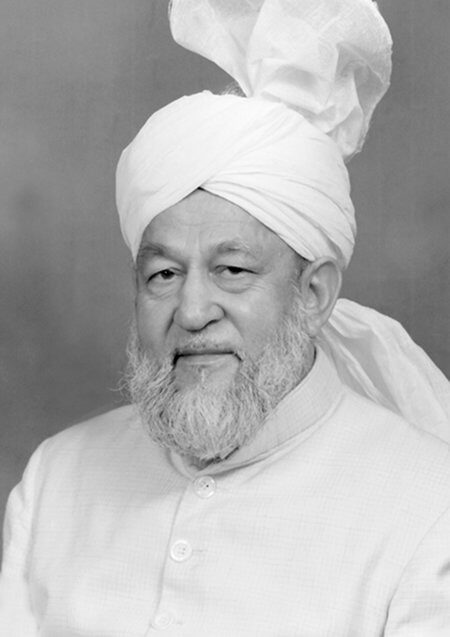
Everyone was out to stop him; traps were laid at every corner, but Allah’s help changed the grave state of fear into security and peace and the danger to Khilafat-e-Ahmadiyya was removed. When Zia found out, “he exploded” and the news sent him “with wild rage”, as Iain Adamson notes. Zia’s end was not good at all and history has the story to tell.
Iain Adamson writes a passage about the migration and Zia-ul-Haq in his book. This passage perfectly encapsulates how Allah has bestowed success to Khilafat-e-Ahmadiyya at every step of persecution. He writes:
“Zia had hoped to silence the Ahmadiyya Movement. Instead he had presented it with its greatest opportunity. London was the crossroads of the world. From London the Khalifa had the opportunity to lead the Ahmadiyya Movement in its mission to convert the world to Islam. ‘God’s ways are wonderful’, said the Khalifa later.” (A Man of God, p. 201)
This single event was a means of “establishing religion” and “security and peace” after fear, as verse 56 of Surah al-Nur promises.
Khilafat-e-Ahmadiyya has flourished in the UK for 36 years now, by the grace of Allah. The past 17 years of the Fifth Khilafat has also seen success after success. Ahmadiyyat has spread to almost every country of the world; the true picture of Islam is being offered to the West by Hazrat Khalifatul Masih Vaa. Generations of Ahmadi Muslim youth, born and bred in the irreligious Western society are learning and practising Islam through the guidance of Khilafat-e-Ahmadiyya. The discourses, sittings and sermons of Hazrat Khalifatul Masih Vaa are translated into a plethora of languages and are a means of solace for millions of Ahmadis, from diverse nationalities.
Hazrat Khalifatul Masih Vaa, like all previous khulafa, is given divine support; a means of transforming fear into peace and security.
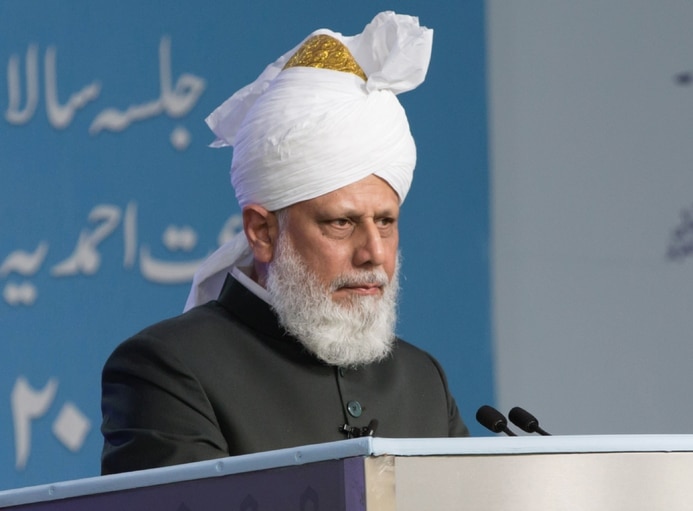
The dark day of 28 May 2010 is stained with the spilling of innocent blood. 94 people were martyred and more than 120 others injured in attacks on two Ahmadi mosques in Lahore, Pakistan exactly ten years ago. The details of the cold-blooded massacre are on record for all to read and witness and the lack of justice that followed is a taint on Pakistan’s government.
A community, that is already barred of basic rights of freedom, stripped of practising their religion and condemned by society, saw the most murders at one time in its history of persecution.
For Ahmadis across Pakistan, this was another message of how society viewed them and what their worth was in their eyes. It was certainly a state of fear, especially for the wives who lost their husbands, children who lost their fathers, mothers and fathers who lost their sons and siblings who lost their brothers.
Many of those martyred were the breadwinners of their household, while others were the only men in their family or the only son a mother had. The emotional cuts this attack brought are incomprehensible.
However, Allah’s promise manifested once again through Khilafat-e-Ahmadiyya. Where Hazrat Khalifatul Masih Vaa calmed the Jamaat and urged everyone to respond with fervent prayers, just like Hazrat Khalifatul Masih IIIrh did during the 1974 Second Amendment, he personally comforted those affected directly.
The MTA series, Zinda Log – based on the lives of martyrs of the Jamaat – shows how each family who had lost a loved one in the Lahore attacks felt instant peace when Hazrat Khalifatul Masih Vaa spoke to them individually over the telephone. They expressed how Huzooraa comforted them, raised their morale, gave advice and assured them that all their needs would be taken care of by the Jamaat. Huzooraa encouraged children to keep their heads high and remember the sacrifice their fathers and brothers made for Ahmadiyyat and to emulate their qualities. He reminded wives and mothers of the great sacrifice their husbands and children gave for Ahmadiyyat and it thus became an honour for the family.
One child spoke of the solace Huzooraa gave him in the following words:
“[Hazrat Khalifatul Masih Vaa] gave me confidence and comfort. He said that if one or five people had been martyred today, then tomorrow double or triple will become Ahmadi. The whole world has received the message of Ahmadiyyat and have become acquainted with our beliefs. This is a new sun that has risen, through which, insha-Allah, a new light shall spread across the earth. Huzooraa gave me comfort and spoke to me in a manner that gave me inner peace.” (Son of Muhammad Ashraf Bullar on the MTA Programme Zinda Log)
The wife of a martyr said the following:
“The relief and comfort I received after speaking with Huzooraa, I could never have imagined. Huzooraa prayed a lot for us and also gave an immense amount of comfort.” (Wife of Dr Umar Ahmad on the MTA Programme Zinda Log)
Another family member spoke of how they felt after listening to Hazrat Khalifatul Masih Vaa:
“… When Huzooraa spoke about him and mentioned all our names, we felt so relieved and comforted. Then, later, Huzooraa called us too. He spoke to me as well and gave me comfort. When Huzooraa was speaking to us, I could not believe it. It felt as if he knew us very personally and deeply; as if he had always known us. We had only seen him on the television. Huzoor’saa love and compassion was such that it removed all our pain, anguish and worries. (Hameed Sami Chaudhry on the MTA Programme Zinda Log)
This is the epitome of khilafat being a means of security and peace after fear. Only Allah’s help can enable this. To comfort people in this manner is not the work of any man; it is the work of God.
Huzooraa also started a series of Friday Sermons detailing the great qualities of each martyr and how the Jamaat should follow their example. Hazrat Khalifatul Masih Vaa highlighted how martyrdom was an honour and reserved for only those whom Allah chose. The series of Friday Sermons gave peace to the whole Jamaat and the understanding of what all divine communities must face. They set the standards for all Ahmadis to follow and reintroduced the honour a martyr holds in Islam.
Yes, there was fear and uncertainty during the Lahore attacks for Ahmadis. But as they looked towards their Khalifa and his reaction and advice, this fear moved towards security and peace. Not only for family members, but for the whole Jamaat. In fact, after the Lahore attacks, the series of Zinda Log shows how other Ahmadis also desired such a noble end and were ready to give the ultimate sacrifice for their faith.
The day of the Lahore attacks was certainly dark, but as Hazrat Khalifatul Masihaa pointed out, it would serve to spread the Jamaat further. This is exactly what happened. Ahmadis in Pakistan and across the world looked towards their Khalifa and reconfirmed their faith and zeal to spread Islam Ahmadiyyat more than before. That is why the Jamaat continues to spread and no matter what comes its way, the history of Khilafat-e-Ahmadiyyat has proven that Allah transforms all states of fear into “security and peace”, while also establishing Ahmadiyyat further.
The Friday Sermons immediately following the Lahore attacks were history repeating itself. Like all the previous Khulafa, Hazrat Khalifatul Masih Vaa reminded Ahmadis of their faith and of the Imam they had accepted.
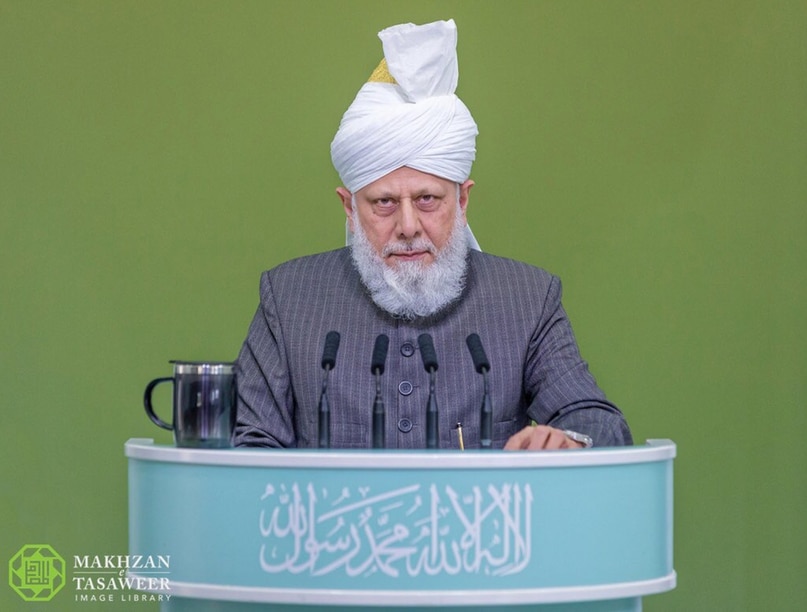
Just a week prior to the Lahore attacks, on 21 May 2010, Huzooraa reminded the Jamaat of how every divine community, including the Holy Prophet’ssa, experienced persecution. Huzooraa explained that there was no reason to fear this persecution as there is always light at the end of the tunnel – God’s help and succour.
Huzooraa said:
“God states that there is no need to be upset over such cruel treatment, for it becomes the source of guidance for many. God is our Helper and Guide; He will most certainly help us and only His appointed one will triumph. For this, God can, if He wills, exhibit heavenly signs. Cruel, powerful, Pharaoh-like rulers cannot hinder the work of prophets of God.
“The Promised Messiahas said that just as manure causes growth for crops, wicked opposition works like a fertiliser for the growth of divine communities. It has always been the way of the criminal-minded to oppose the elect of God. Therefore, it was but natural that following the claim of the Promised Messiahas, this was to materialise, and it did.” (Friday Sermon, 21 May 2010)
How great is Allah! Through His Khalifa, the Jamaat members are, at every corner of fear, given solace, security and peace. They march forward and accept every will of God and no blow can throw them to the ground.
In 2011, Hazrat Khalifatul Masih Vaa reminded the Jamaat about our responsibilities considering persecution against the Jamaat. He said that despite strong winds of opposition since the time of the Promised Messiahas, Allah has always fulfilled His promise for the Jamaat and spread it to more than 200 countries. But, Huzooraa asked, are we fulfilling our roles as Ahmadis?
“At every step, we are witnessing the help and succour of God the Almighty. The only worry we should have is whether we are bowing before God. Are we prostrating before God with humility or not? … Dampen your places of prostrations [with tears]. We should call upon the God of the Holy Prophetsa, Who made the weak into rulers.”
Instances of fear and worry are part-and-parcel of divine communities. Our history proves how Allah’s promise of establishing religion for Khilafat and changing fear into security and peace has always come true. However, like the Promised Messiah’sas core message preached, have we created that spiritual transformation within ourselves that Khilafat-e-Ahmadiyya strives for?


Alhamdoulilah , Alhamdoulilah…. May Allah Continues To Shower Lots n Lots of Blessings, To Our Sacred Khilafat Institution …..